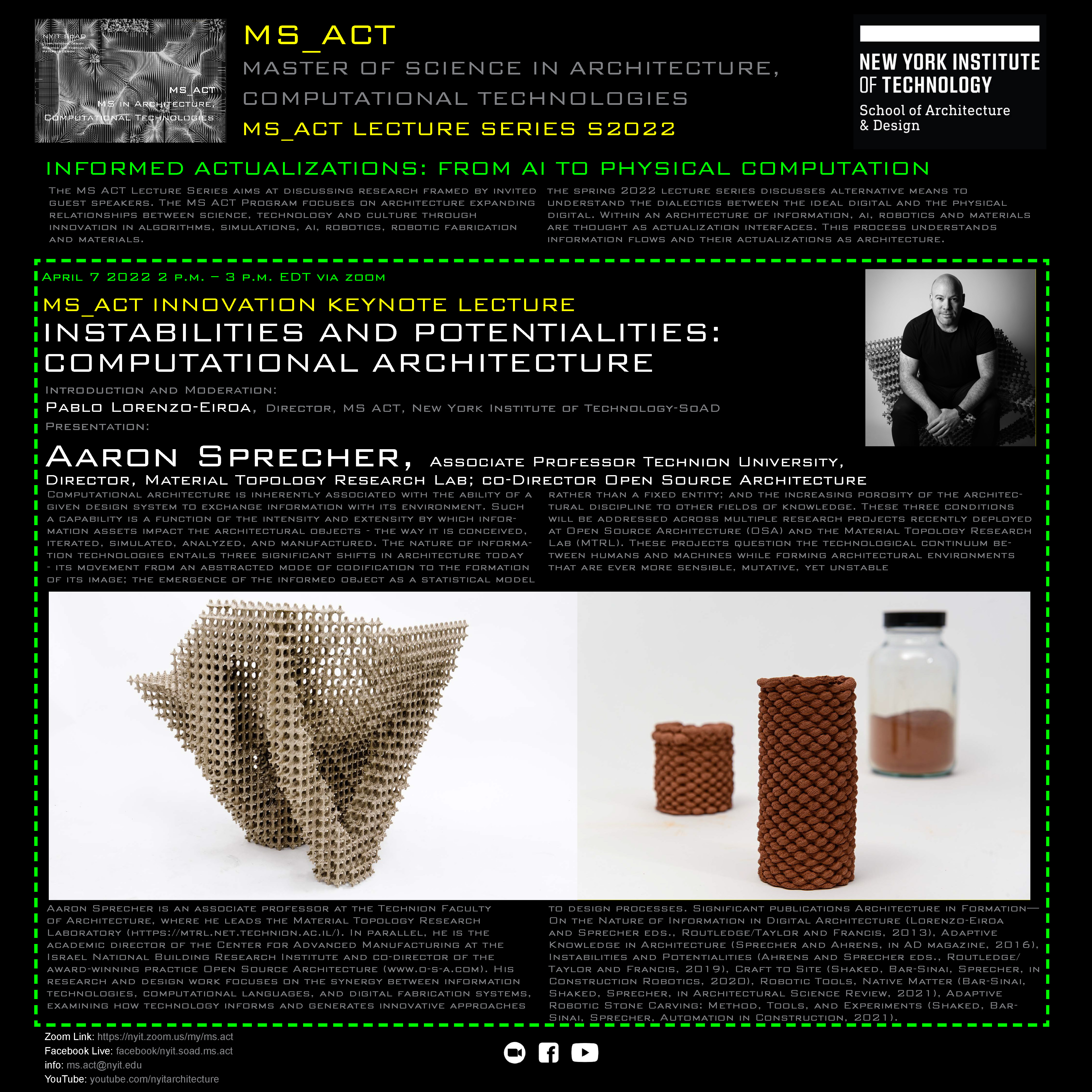Architecture Computational Technologies
Explore design research at the frontiers of architecture through experimentation in computational design, robotic systems applied to fabrication and interactivity, and materiality. For more information please contact ms.act@nyit.edu
INSTABILITIES AND POTENTIALITIES: ACT INNOVATION KEYNOTE LECTURE AARON SPRECHER
MS_ACT
Master of Science in Architecture,
Computational Technologies
MS_ACT LECTURE SERIES S2022
Informed actualizations: From AI to physical computation
The MS ACT Lecture Series aims at discussing research framed by invited guest speakers. The MS ACT Program focuses on architecture expanding relationships between science, technology and culture through innovation in algorithms, simulations, ai, robotics, robotic fabrication and materials. The spring 2022 lecture series discusses alternative means to understand the dialectics between the ideal digital and the physical digital. Within an architecture of information, ai, robotics and materials are thought as actualization interfaces. This process understands information flows and their actualizations as architecture.
April 7th 2022 2 p.m. – 3 p.m. EDT via zoom
MS_ACT INNOVATION KEYNOTE LECTURE
INSTABILITIES AND POTENTIALITIES: A KEYNOTE ADDRESS ON
COMPUTATIONAL ARCHITECTURE
Introduction and Moderation:
Pablo Lorenzo-Eiroa, Director, MS ACT, New York Institute of Technology-SoAD
Presentation:
AARON SPRECHER,
Technion Faculty of Architecture; Director, Material Topology Research Laboratory; Co-Director Open Source Architecture
Computational architecture is inherently associated with the ability of a given design system to exchange information with its environment. Such a capability is a function of the intensity and extensity by which information assets impact the architectural objects - the way it is conceived, iterated, simulated, analyzed, and manufactured. The nature of information technologies entails three significant shifts in architecture today
- its movement from an abstracted mode of codification to the formation of its image; the emergence of the informed object as a statistical model rather than a fixed entity; and the increasing porosity of the architectural discipline to other fields of knowledge. These three conditions will be addressed across multiple research projects recently deployed at Open Source Architecture (OSA) and the Material Topology Research Lab (MTRL). These projects question the technological continuum between humans and machines while forming architectural environments that are ever more sensible, mutative, yet unstable.
Aaron Sprecher is an associate professor at the Technion Faculty of Architecture, where he leads the Material Topology Research Laboratory (https://mtrl.net.technion.ac.il/). In parallel, he is the academic director of the Center for Advanced Manufacturing at the Israel National Building Research Institute and co-director of the award-winning practice Open Source Architecture (www.o-s-a.com). His research and design work focuses on the synergy between information technologies, computational languages, and digital fabrication systems, examining how technology informs and generates innovative approaches to design processes. Significant publications Architecture in Formation—On the Nature of Information in Digital Architecture (Lorenzo-Eiroa and Sprecher eds., Routledge/Taylor and Francis, 2013), Adaptive Knowledge in Architecture
(Sprecher and Ahrens, in AD magazine, 2016), Instabilities and Potentialities (Ahrens and Sprecher eds., Routledge/Taylor and Francis,
2019), Craft to Site (Shaked, Bar-Sinai, Sprecher, in Construction Robotics, 2020), Robotic Tools, Native Matter (Bar-Sinai, Shaked,
Sprecher, in Architectural Science Review, 2021), Adaptive Robotic Stone Carving: Method, Tools, and Experiments (Shaked, Bar-Sinai, Sprecher, Automation in Construction, 2021).
Zoom Link:
https://nyit.zoom.us/my/ms.act
info: ms.act@nyit.edu
YouTube: https://www.youtube.com/channel/UC3kjiPr82e1pGkPKaZ6hjnQ
https://blogs.nyit.edu/msact
More Posts
All PostsMay 31, 2022
MS_ACT INNOVATION KEYNOTE LECTURE Kaicong Wu
May 26, 2022
MS ACT Lecture Shai Yeshayahu
May 16, 2022
